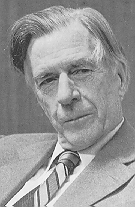Galbraith, of course, is a bit of a celebrity himself. As the century's best-known Harvard professor, president of both the American Economic Association and the American Academy of Arts and Letters, ambassador to India, economics editor of Fortune and World War II price czar, he's enjoyed the careers of a dozen illustrious men in a single life. More important, he has left to succeeding generations a body of work that still speaks with indelible power and authority--and is a recurring challenge to much of what passes for economic wisdom nowadays.
Conservatives and the more mathematically entranced among his colleagues will no doubt demur, as they have for half a century. Yet in American Capitalism, The Affluent Society, The New Industrial State and Economics and the Public Purpose--the quartet that forms the heart of "Galbraithian economics"--there are empirical insights and analytic formulations as rich today as when they were first written. Of equal importance, his is the enduring model of the intellectual as engaged citizen, a superb intelligence who took his fellow citizens--not his fellow academics--as the ultimate audience, and took the secure future of a generous, democratic people as the test of social science's purpose.
In the fifties and sixties, all too many of his colleagues thought they'd found a Rosetta stone in an abstruse combination of econometrics, game theory, advanced regression analysis and computer forecasting that would unlock the market's secrets and thereby tame its nasty cyclical fluctuations and tendencies toward maldistribution. These mid-century economists convinced themselves that because economic "laws" bore irrefutable kinship to the laws of nature, economics itself could now become the physics of the social sciences. Galbraith knew better. He understood even then that economics--far from replicating a physics that ultimately describes forces indifferent to our existence--was instead a strikingly malleable story for describing (and, not least, shaping) our social and political relations and aspirations--the ultimate achievements of human consciousness.
As such, economics needed to be conducted "out in the open," in a language citizens could engage without esoteric training and use to debate the purposes of being free and democratic themselves. Never content with a university-bound role, he threw himself into liberal and Democratic Party politics for more than half a century, in dozens of official and unofficial capacities, from New Deal administrator to New Frontier ambassador--and when the horror of Vietnam grew unbearable, into active dissent and leadership of both the McCarthy and the McGovern insurgencies.
Yet he also knew why both established power and "the conventional wisdom" would ever resist the efforts of men and women like himself, in economic teaching as well as public life. As he observed in American Capitalism nearly fifty years ago, "Man cannot live without an economic theology--without some rationalization of the abstract and seemingly inchoate arrangements which provide him with his livelihood." The years since Galbraith wrote those words stand as their proof: Americans have collectively endured first oil, then global debt, crises; the worst recession since the Great Depression; the S&L scandal; a quintupling of the federal debt in the name of "market freedom"; and the most dramatic increase in wealth and income inequality since the Gilded Age. Yet despite all this tribulation, "The Market"--as Harvard theologian Harvey Cox recently noted--"may be the world's most powerful and fastest-growing religion today."
Galbraith, though, claims to remain sanguine about the longer term. Born when Teddy Roosevelt was President, he's survived earlier and in some ways more fervid eras of "market worship" in both the twenties and the fifties. And he's quick to remind us of the vacuous peculiarity of proclaiming "the market's" triumph today, when the public sector still accounts for nearly half of all GDP in the advanced capitalist countries. Yet he also has no doubt that the reasons for economists' persistent unwillingness to name the causes of capitalism's recurrent crises and growing maldistribution are still those he identified a quarter-century ago: "This is what economics now does. It tells the young and susceptible and the old and vulnerable that economic life has no content of power and politics. ... Such an economics is not neutral. It is the influential and invaluable ally of those whose exercise of power depends on an acquiescent public."
For an age seemingly desperate to convince its inhabitants that abstractions labeled The Global Economy and The Information Age are novel, universal and implacable forces that brook no resistance, that democratic states and their citizens are subordinate (or even irrelevant) to them and that resistance is folly, Galbraith offers a durable reminder: "It is inconceivable that the public could be universally exploited without being aware of it. ... The first step in reform, it follows, is to win emancipation of belief." He says he's looking forward to revisiting some of these themes in his next book, due out sometime in his ninety-first year.





